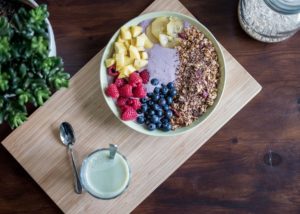Cultivating a Positive Body Image
When we look at ourselves in the mirror, we may find ourselves satisfied and happy with what we see. In the last few years, as selfies and other cameras have gotten higher and higher definition, and in the last few years of the pandemic, as we’ve had to look at ourselves in online meetings, we’ve become more aware of our looks.
That awareness can be a good thing if it is met with an appreciation of what we see, but it can be frustrating and even devastating if we don’t like what we see. That freckle or the slight crook in our smile, our skin tone or hairline, the shape of our nose or of our legs – it’s possible for us to begin looking at these things and wanting to change them because we aren’t happy with them. There is, however, another way to go, and that’s to cultivate a positive body image towards yourself.
What is body image?
 Your body image simply refers to how you perceive your own body and your assessment of your physical appearance. It encompasses your emotional responses, your attitude, beliefs, and perceptions of your own body.
Your body image simply refers to how you perceive your own body and your assessment of your physical appearance. It encompasses your emotional responses, your attitude, beliefs, and perceptions of your own body.
If you have a negative body image, that means you feel dissatisfied with what your body looks like. When you compare yourself to other people or to the standard that you believe society holds concerning our bodies, you feel you compare unfavorably.
A negative body image can lead a person to have a distorted image about certain parts of or their whole body, and it can often lead to feelings of shame and embarrassment. It means that you’re literally not happy in your own skin and probably walk around wishing you were someone else.
When you have a positive body image, on the other hand, it means that even when it doesn’t match other people’s ideals, you accept your own body for what it is and feel comfortable in it.
That doesn’t mean that you never want to look a little different; on some days, you might wish you could change how you look, including the desire to lose a bit of weight or have a bit more definition. But a positive body image means that on most days you feel confident and are happy with the way you look.
There are several things that influence our body image, and it goes beyond what we see in our bathroom or hallway mirror. How we perceive ourselves is a complex combination of our beliefs, the experiences we have in life, the generalizations we make, and the influence of our culture, friends, family, the fashion industry, and popular culture, as well as the social and other media we consume.
 By conveying positive and negative messages, all of these can combine to shape our views on what is beautiful, ideal, and acceptable, as well as what is not, thereby affecting how a person sees and relates to their own body. These different influences encourage us to adopt certain beliefs about bodies – those of others and our own – and often we end up possessing idealized images of the body that are often unrealistic and usually unattainable.
By conveying positive and negative messages, all of these can combine to shape our views on what is beautiful, ideal, and acceptable, as well as what is not, thereby affecting how a person sees and relates to their own body. These different influences encourage us to adopt certain beliefs about bodies – those of others and our own – and often we end up possessing idealized images of the body that are often unrealistic and usually unattainable.
If a person suffers an illness or undergoes an accident that changes their appearance, that can make them reconsider their body image and generate a negative body image. Having breast cancer and undergoing a mastectomy can affect a person’s body image, as can having a skin condition such as acne or eczema, or having a limb amputated due to an accident.
When a person has certain experiences such as discrimination based on their race, body size, or age, that too can undermine their confidence and deliver the message that they are not worthy of respect or that they are somehow lacking something and do not measure up.
Cultivating a healthy body image
There are a lot of cultural voices that militate against having a healthy and positive body image. As our broader culture has become more visually oriented, mediating our communications and interactions in increasingly visual ways, whether through our portable devices, our televisions, laptops, and so on, we are constantly bombarded by images from across the globe.
We upload hundreds of millions of photos online on various social media platforms, and that’s to say nothing of the millions of videos that are uploaded on sites like YouTube. A decade ago, around 2012, more pictures were taken every two minutes than were taken throughout the entirety of the 1800s, and that number has only continued to grow.
The point is, that we see a lot of images, and those play a huge role in shaping our self-perception. We see what gets likes, retweets, and what gets reposted, and that shapes our value system. The body positive movement has helped immensely to ensure that a greater diversity of bodies get coverage in our different forms of media, but it is still grossly disproportionately skewed toward the supermodel and hunk side of things.
We are exposed daily to images of people we don’t know, whose lives are glamorized, and have that sheen of unreality that makes them all the more desirable and simultaneously unattainable.
To cultivate a healthy and positive body image, here are a few things that you can do:
 Avoid comparisons. When we compare ourselves to other people, we can land ourselves in a bad space. On social media, and other forms of media in general, people put their best selves in their feeds, offering that up for consumption by the public. That snapshot of a person’s life is all we get, but we can make a meal of it, comparing the entirety of our lives with that one moment.
Avoid comparisons. When we compare ourselves to other people, we can land ourselves in a bad space. On social media, and other forms of media in general, people put their best selves in their feeds, offering that up for consumption by the public. That snapshot of a person’s life is all we get, but we can make a meal of it, comparing the entirety of our lives with that one moment.
We should avoid comparisons with others in general because the grass usually looks greener on the other side, and it stirs discontent within us. It’s even worse with social media, because we become hyper-focused on these snapshots and slices of a person’s life, and we can easily begin to feel uncomfortable about our own bodies, leading to distress and ill health.
Exercise, but for fitness and not appearance. Just as avoiding comparison can help us avoid the trap of measuring our lives on the basis of appearances, it is far better to work out for your health than it is to look good. If, in working out to get fit, more flexible, and so on, you start to not only feel good but begin enjoying how you look, that’s a welcome bonus.
A study in 2015 found that people that exercise for functional reasons such as getting fit and staying healthy tend to have a more positive body image, while those that pursued exercise to improve their appearance felt less positive about their bodies.
Exercise in general makes you feel good, boosting your mood and making you more aware of what your body can do, and that’s a great thing. But when it’s aimed at looking good, that can detract from the many benefits of working out. Get a workout in and focus on the amazing things you can accomplish when you put your mind to it.
Appreciate what your body can do. Your body is there for you. With it, you can laugh, create, dance, embrace your loved ones, feel the breeze or the surf, and enjoy the feel of grass and the smell of flowers. These are all wonderful gifts, and we can turn our minds to appreciate the many things that our bodies can do.
It’s true that we often take our bodies for granted; we only really notice them when something gets hurt or stops functioning as it should. The rest of the time, we don’t notice it except to notice what might not be the right size or shape.
Instead, a healthier way to go about things is to appreciate all the things your body can do. Do yourself a favor and curl your toes in bed, give yourself a nice big stretch, lift your child or hug your loved one. Take a look at the things you can create, at the problems you can solve with your body and mind, and celebrate them.
Learn self-acceptance. You are who you are, and your life is what it is. Perhaps it doesn’t need a filter, whether in posting only your best photos or in applying a literal filter to your pictures to look other than what you really do. It also helps to embrace positive self-talk such as reminding yourself that you are wonderfully and fearfully made by God, and therefore precious in his sight (Psalm 139).
 Get comfortable with yourself. Being comfortable with yourself may mean doing something as simple as finding clothes that are comfortable and help to make you feel good about your body.
Get comfortable with yourself. Being comfortable with yourself may mean doing something as simple as finding clothes that are comfortable and help to make you feel good about your body.
More than ever before, there are fashionable and varied choices out there, and unless your job has a strict dress code, you can be eclectic in your fashion choices to arrive at what works for you. You can also do something nice for your body, including daily self-care, or getting a massage and a haircut to take care of your body.
Keep your eyes off your body and on the Lord. One of the downsides of the body positive movement is that it continues to place an emphasis and focus on bodies. While they are an important gift that we need to take care of, there’s more to life than our bodies and what they look like. We are served well by keeping things simple for ourselves.
Paul reminds his young protégé, Timothy, that the pursuit of excess and riches can bring sorrow, saying, “For we brought nothing into the world, and we can take nothing out of it. But if we have food and clothing, we will be content with that” (1 Timothy 6: 7-8 NIV). We can become so focused on what our bodies look like, whether they conform to some ideal, that we neglect to attend to what our bodies are for – God’s glory.
In another letter to the believers in the city of Corinth, Paul wrote, “The body, however, is not meant for sexual immorality but for the Lord, and the Lord for the body. By his power, God raised the Lord from the dead, and he will raise us also.
Do you not know that your bodies are members of Christ himself?” and he goes on to say, “Do you not know that your bodies are temples of the Holy Spirit, who is in you, whom you have received from God? You are not your own; you were bought at a price. Therefore honor God with your bodies” (1 Corinthians 6: 13-15, 19-20 NIV).
Instead of being overly concerned with our bodies, about what we wear and eat and what size we are, we can rather pool our energies into developing our character and being the sort of people God desires us to be. We can focus on others and their needs, and how we can serve them well as we work for the kingdom.
Talking about the kingdom of God may make people think of ethereal, floating existences where bodies don’t exist or matter. The Christian faith is not a disembodied faith that is uninterested in bodies. Bodies matter immensely, but excessive or misapplied focus on them is decidedly unhealthy.
If you need specific encouragement for any issues you have about body image, consider meeting with a Christian counselor. There may be unresolved problems behind the way you see yourself, and a caring counselor can help you heal from the past and overcome your hang-ups.



